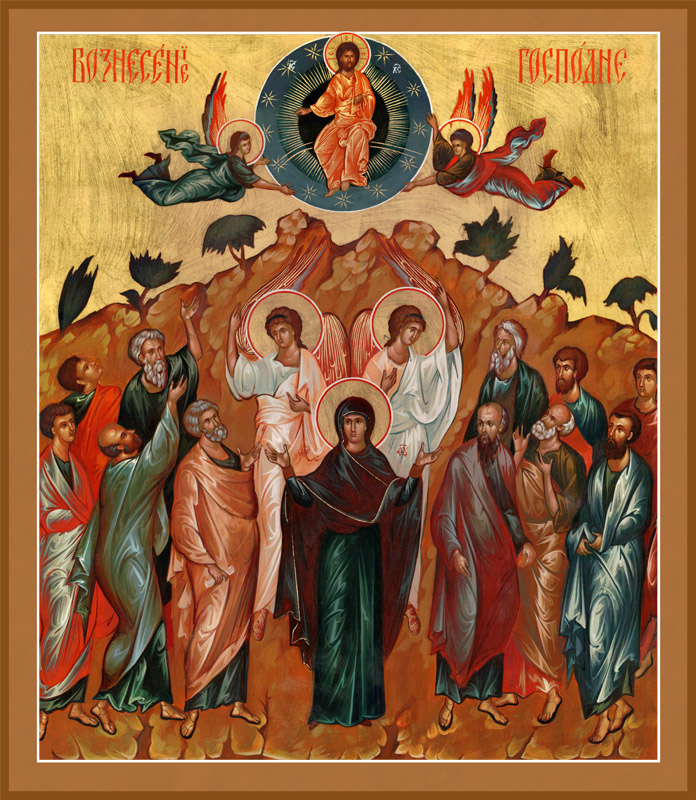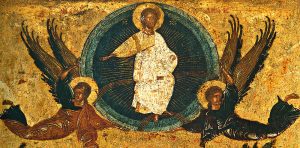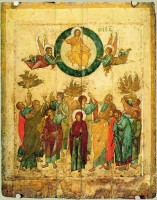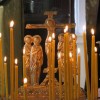 The Lord dwelt on earth for forty days after His Resurrection. But He was not with the disciples constantly, but appeared and spoke with them from time to time, sometimes in another form, for which reason the Apostles could not outwardly recognize their Teacher (Mark 16:12). Thus, on the road to Emmaus the disciples knew the Lord only in the breaking of bread, later lamenting that they had not hearkened to the voice of their hearts burning within them while Jesus spoke with them along the way. The Lord, as it were, accustomed the Apostles to another kind of communication, not like when He spoke and exhorted them directly, but to a transfigured and loftier communication in spirit and in truth (John 4:23).
The Lord dwelt on earth for forty days after His Resurrection. But He was not with the disciples constantly, but appeared and spoke with them from time to time, sometimes in another form, for which reason the Apostles could not outwardly recognize their Teacher (Mark 16:12). Thus, on the road to Emmaus the disciples knew the Lord only in the breaking of bread, later lamenting that they had not hearkened to the voice of their hearts burning within them while Jesus spoke with them along the way. The Lord, as it were, accustomed the Apostles to another kind of communication, not like when He spoke and exhorted them directly, but to a transfigured and loftier communication in spirit and in truth (John 4:23).
Earthly life cannot go on forever; it is not the goal of our cherished aspirations. We are only guests and wanderers here, as we accomplish our procession into eternity. Now, forty days after His Resurrection, the Lord shows us the path of this ascent through His Ascension.
It would seem that the Lord could have simply disappeared, once He had parted with the disciples, by melting nicely into the air. But He commanded His disciples to climb the Mount of Olives, where He presented Himself to them before ascending. Imagine the disciples standing with their heads thrown back, having forgotten everything earthly, looking rapturously into the heavens. They probably could neither disperse nor tear their eyes away from the heavens for a long time…
I think there is a hidden, deeper meaning in this ascent, in this total upward striving. The spiritual heavens are not, of course, located above our heads. After all, the Lord did not ascend into the cosmos, where cosmonauts later “didn’t see” Him, but into other, unfathomable heights – into the Kingdom that is “within us.” But this difference from our customary horizontal life is expressed outwardly through an upward ascend, as a reminder that we need to strive upwards towards God.
 We must all rise above vanity, above agitation, above everyday cares, and to step over our human fears – fear, in general, is false – that repeat to us: “What prayers? What ascension? Look around: you need to sink your teeth into this earthly firmament, to dig your claws into it, in order to live, to exist, to take back your place under the sun!” This is a perfectly natural feeling. But there was a reason why the Apostle Paul said that the natural man does not inherit that which comes from the Spirit of God. What is “natural” for us stands in irreconcilable conflict with the “supernatural” call to perfection.
We must all rise above vanity, above agitation, above everyday cares, and to step over our human fears – fear, in general, is false – that repeat to us: “What prayers? What ascension? Look around: you need to sink your teeth into this earthly firmament, to dig your claws into it, in order to live, to exist, to take back your place under the sun!” This is a perfectly natural feeling. But there was a reason why the Apostle Paul said that the natural man does not inherit that which comes from the Spirit of God. What is “natural” for us stands in irreconcilable conflict with the “supernatural” call to perfection.
The Lord tells us: But seek ye first the kingdom of God, and His righteousness (Matthew 6:33). As for what you will eat or drink, or how you will be clothed, all of that will be added onto you. But we do just the opposite: we persistently and diligently seek what to eat, what to drink, and how to be clothed. But as for the Kingdom of God – well, we think, it will somehow get added on by itself… Alas! We turn God’s commandment upside down without even realizing it! Instead of ascending to God, we want Him to descend into our darkness and “bless” it without changing or scattering it, to “approve” and sanction it, leaving things exactly as they were… We persistently and stubbornly make “gods” in our image and likeness and want to live only as we like, the way we want to, in whatever way seems right and convenient to us.
Recall the Eucharistic canon: “Let us lift up our hearts.”
Of course, we need to put everything aside at least sometimes and lift up our gaze and our heart.
When we look upwards, we cannot engage with anything earthly; at that moment we cannot even take a single step. But this standstill, this prayer, this standing in the Spirit is not a fruitless waste of time when we could, it might seem, be doing so many useful and necessary things. This is a time of gathering, of communion with God. In this communion we can acquire the most important thing: a clear vision and understanding of what we need to do and how. It is this understanding that we often lack when we toss and turn and do a thousand things at once, but without really accomplishing anything necessary. We ultimately end up back where we started.
Perhaps it was to bring us to a standstill, to make us look on high, to direct our attention upwards, towards God, that the Lord exhorted us with such extraordinarily inspiring words when ascending to Heaven: Lo, I am with you always, even unto the end of the world (Matthew 28:20). This means that the Ascension is neither a withdrawal nor a break, but a call to transfiguration, to our own active ascent to God, to our humble ascent upwards. Let us follow the Lord into His Kingdom!
Translated from the Russian

















